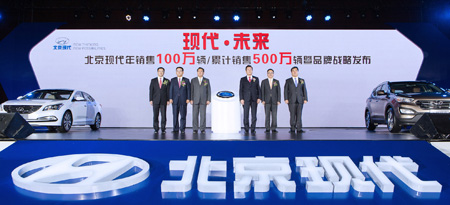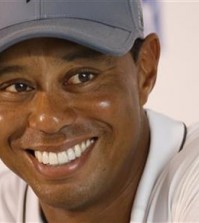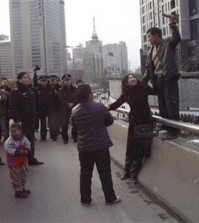- California Assembly OKs highest minimum wage in nation
- S. Korea unveils first graphic cigarette warnings
- US joins with South Korea, Japan in bid to deter North Korea
- LPGA golfer Chun In-gee finally back in action
- S. Korea won’t be top seed in final World Cup qualification round
- US men’s soccer misses 2nd straight Olympics
- US back on track in qualifying with 4-0 win over Guatemala
- High-intensity workout injuries spawn cottage industry
- CDC expands range of Zika mosquitoes into parts of Northeast
- Who knew? ‘The Walking Dead’ is helping families connect
Hyundai’s vehicle sales in China cross the one million mark
Carmaker to focus on strengthening brand image

Hyundai Motor Group Vice Chairman Seol Young-heung, fourth from left, poses with Choi Sung-kee, second from left, chief of Beijing Hyundai Motor Company, and Chinese officials at an event to celebrate the sale of 1 million vehicles in China for the year in Beijing, Wednesday.
(Courtesy of Hyundai Motor Group)
By Choi Kyong-ae
Hyundai Motor has outlined a 10-year plan to bolster its growth in China as its annual sales marked 1 million vehicles and therefore feels the need for a stronger push into the market.
“Selling as many vehicles as possible has been our main growth strategy in China for the past 10 years. Now we are also looking to strengthen our brand image in pursuit of a balanced growth for another 10 years,” Hyundai Motor said in a statement released on Wednesday.
China has been one of Hyundai Motor’s big-growth markets along with the U.S. and Europe. The Korean top carmaker began operations in China in 2003 when it sold a mere 53,130 vehicles in the world’s most populous country.
Hyundai Motor exceeded 1 million vehicles sales in China early this month and is on track to sell 1.03 million for the year. Increased local production and higher local demand for customized models buoyed its sales in China, the statement said.
“We will promote Hyundai Motor as a premium brand which is perceived as creative and considerate about local customers’ lives,” Hyundai Motor Vice President Choi Sung-kee said in the statement.
Under the slogan of “Modern Premium,” Hyundai which has long been regarded as a mass-market brand has stepped up efforts globally to make a presence in the high-end car segment with the launch of the Genesis sedan and the Equus sedan in the U.S. It plans to introduce the fully-revamped Genesis sedan in the U.S. and Europe next year.
To publicize the premium strategy in China, the company will hold a series of campaigns to bolster its corporate brand image and to improve product quality and after-sales services, said Choi who also serves as chief of Beijing Hyundai Motor Company.
Moreover, the maker of the Sonata sedan and the Santa Fe sport-utility vehicle is planning to increase the number of dealerships in China to 1,000 by 2015 from the current 860 to absorb a rising demand in the central and western parts of China, the statement said.
When it comes to production, Hyundai is looking for a site to build its fourth plant in China. It already has three local plants which have a combined capacity of 1 million vehicles.
Meanwhile, Hyundai has generated the term “Hyundai Speed” in China for achieving a stellar performance in just a couple of years since its advance to the world’s biggest automobile market.
Its sales in China are expected to increase fourfold from 231,137 units in 2007 to an estimated 1.03 million in 2013. It took an average of 23 years for two joint ventures set up between Volkswagen AG and Chinese partners to achieve the 1 million annual sales target in China from 2010-2011, according to Hyundai.
Hyundai said it had sold an accumulated 5 million vehicles in the past decade in China, meaning the market “will remain a core growth driver” for Hyundai Motor.
In his recent meeting with overseas sales chiefs, Hyundai Motor Chairman Chung Mong-koo urged them to continue sales growth in major markets such as China by focusing on quality and brand marketing.
Chung said “a possible slowdown in the U.S. and China may emerge as a threat next year, with Japanese carmakers benefiting from a weaker yen and European automakers recovering after restructuring.”
Hyundai Motor and its 34 percent-owned Kia Motors expected to sell a total of 7.5 million vehicles globally this year. Hyundai and Kia originally targeted 7.41 million in combined sales. The two form the world’s fifth-biggest carmaker by sales.
But analysts have cautioned that Hyundai and Kia will have a tougher battle next year due to the won’s strength which can hurt their price competitiveness overseas and imported carmakers’ stronger push to claim a bigger share in Korea.












![일본 사도광산 [서경덕 교수 제공. 재판매 및 DB 금지]](http://www.koreatimesus.com/wp-content/uploads/2024/07/PYH2024072610800050400_P4-copy-120x134.jpg)


